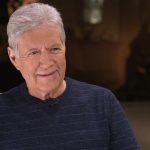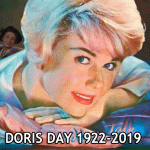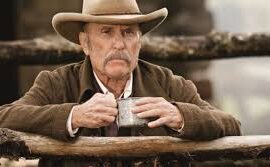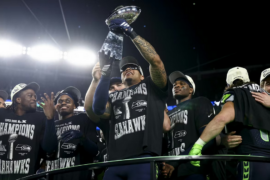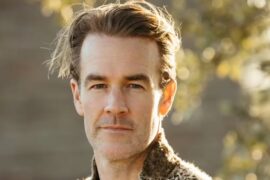
This Thursday is the series finale of Canada’s most-watched TV show for nearly a decade — The Big Bang Theory. Brioux.TV takes a look back at set visits and cast interviews over the past dozen years.
Part One (June, 2007): CBS introduces the cast and producers to reporters in Pasadena, Calif., at the Television Critics Association press tour. Many of us in that room were familiar with Galecki from Roseanne and some remembered Cuoco from 8 Simple Rules but Parsons is pretty much an unknown.
Among the things we learn that day is that Galecki was originally called in to read for the part of Sheldon. “I think I’m more drawn to playing Leonard,” Galecki told executive producer Bill Prady at that first meeting. The producers eventually agreed once they found Parsons, who was at that point making a name for himself on New York theatre stages. Declared Galecki at the press conference, “I couldn’t hold a candle to what Mr. Parsons is doing with that role.”
What follows is an edited version of the transcript from that first session:
QUESTION: Chuck, just silly question. Is it a coincidence that the two leads are named Sheldon and Leonard?
CHUCK LORRE: No.
advertisement
QUESTION: Is that — I mean was that homage?
CHUCK LORRE: A fromage. Yes. There was just a little hero worship on our part.
QUESTION: And actually, for both of you, just how smart are you guys?
JIM PARSONS: In real life?
QUESTION: Yes.
JIM PARSONS: I’m going to actually answer for Johnny. Johnny seems very intelligent to me thus far. (Laughter.) He’s taken me to some nice restaurants, and we’re getting to know each other to work and —
JOHNNY GALECKI: Zagat guide —
JIM PARSONS: The Zagat guide — research is half the battle.
JOHNNY GALECKI: I’m sorry. How — well, not nearly as intelligent as the character obviously, but I did really well all the way through the middle of eighth grade (Laughter.)
QUESTION: Mr. Lorre, I understand the contrast that you’re going for and everything, but does she have to be that stupid? I mean, she has no idea the effect she’s having on these guys, and this is no offense to you, by the way, Kaley. I’m sorry.
KALEY CUOCO: I can’t even see you, but when I do — (Laughter.) I’m just kidding.
QUESTION: I mean, I know you’re reading lines, but she doesn’t have any idea that she’s incredibly attractive. She’s walking around in a towel. The guys are falling all over themselves and —
CHUCK LORRE: What are you trying to say?
QUESTION: I’m saying she makes Chrissy Snow look like the president of Mensa.
KALEY CUOCO: Oh, come on now.
CHUCK LORRE: Well, actually, you know, as we get more into developing the series and the characters, we’re going to learn that her character is extremely capable. She grew up on a farm. She can fix a tractor. She can birth a calf, and she can do just about damn near anything that these guys can just sit around and talk about and complicate. So she’s an extraordinary character in her own right, but in a different world than theirs.
QUESTION: But she doesn’t understand the effect she has on men?
BILL PRADY: No, I think she absolutely understands the effect she has on men.
QUESTION: It wasn’t apparent in the pilot.
CHUCK LORRE: We’ll try harder.
QUESTION: For the producers, how authentic are, for example, the formulas we saw on Sheldon’s and Leonard’s whiteboards? And how much are you expecting real math nerds and geeks to tune in and be able to critique those or love them because they’re real?
BILL PRADY: Everything was authentic. We have a consultant who is a physicist and astrophysicist at UCLA, who came in and drew our boards for us. And, in fact, we’re working on giving Sheldon an actual problem that he’s going to be working on throughout the season so there’s actual progress to the boards. We worked hard to get all the science right.
QUESTION: Do you know what the boards actually say, or could they be sneaking something past you and past the censors of a geeky joke?
CHUCK LORRE: We hope so.
QUESTION: Simon.
SIMON HELBERG: Hi.
QUESTION: Can you talk a bit about how you came to this project and at what point you knew “Studio 60” was imploding and how you went from there to here?
SIMON HELBERG: Yeah. One didn’t really have anything to do with the other. It had nothing to do with the success of “Studio 60.” I — I thought that this project was really funny, and it spoke to me. I mean, it’s a stretch for me to obviously play a nerd — (Laughter.)– but I’m willing to study with a coach and –(Laughter.) — do what I need to do.
QUESTION: Question for Johnny, talk a little bit about developing the comedy timing. First of all, you were quite young when you were on “Roseanne,” and during those years, was there something — did you get some sensibilities about comedy from that?
JOHNNY GALECKI: The first three or four episodes, I think you were there, yes. Yeah. I learned a lot from being on that show especially — I mean Rose and John and Laurie couldn’t be more different types of actors. Laurie, being from the theater in Chicago where I’m from and John being a very disciplined film actor. And Rose, who just likes to wing it, likes to go on stage and wing it as a comic. So to be able to kind of pick and choose and create my own imagination of what kind of worked for me was just a priceless experience and lessons. I wasn’t an actor before I did that show, before I started it. But when I started that show, learning from those three especially was amazing.
QUESTION: And then, we lost track of you for a while. And now, when we see you here, you’ve got a really distinctive comedy touch. What was the next step to develop that? Did you develop some of that on stage, or did it just come out of this character or what happened?
JOHNNY GALECKI: Oh, probably a bit of both, I suppose. I mean, you know, it always helps with a studio audience too. A studio audience always kind of guides a pace or a mood or an energy, and they’re a palpable character in the room. But it’s also the writing and character and playing off Jim especially.
JIM PARSONS: Huge help.
JOHNNY GALECKI: Yeah, he’s a — (Laughter.)
CHUCK LORRE: The first time they read together, it was real obvious that we had a remarkable combination of talents, really something.
QUESTION: Question for the producers, does Leonard have a real shot at Penny? And what happens when that’s resolved one way or the other? Doesn’t that sort of damage the tension on the show if he gets rejected or more than probably scores?
CHUCK LORRE: It’s a question we hope you’ll keep asking for many years.


